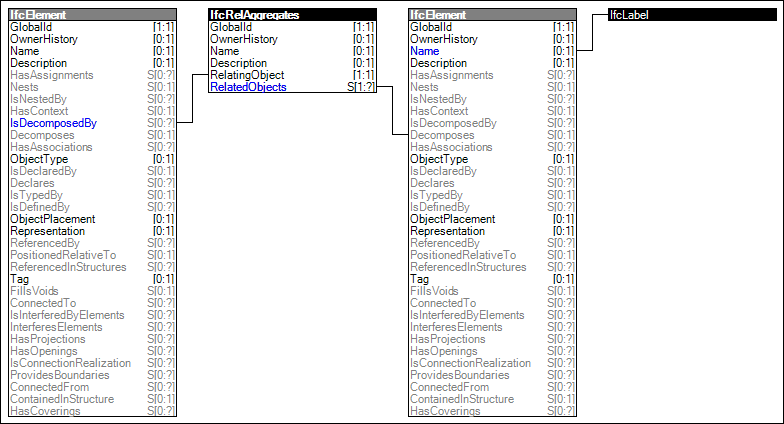
Figure 28 — Element Decomposition
Provision of an aggregation structure where the element, representing the composite, is decomposed into parts represented by other elements.
The composite then provides, if such concepts are in scope of the Model View Definition, exclusively the following:
By default the following constraints apply to an element being decomposed by Element Decomposition:
NOTE Use the sub template Element Decomposition Required if any instance of the element is required to represent a composite with declared parts.
Figure 28 illustrates an instance diagram.
 |
Figure 28 — Element Decomposition |
<?xml version="1.0"?>
<ConceptTemplate xmlns:xsi="http://www.w3.org/2001/XMLSchema-instance" xmlns:xsd="http://www.w3.org/2001/XMLSchema" uuid="8a27c15a-c4ea-4ca9-8cce-7fbba1c9bce0" name="Element Decomposition" applicableSchema="IFC4" applicableEntity="IfcElement">
<Rules>
<AttributeRule RuleID="IsDecomposedBy" AttributeName="IsDecomposedBy">
<EntityRules>
<EntityRule EntityName="IfcRelAggregates">
<AttributeRules>
<AttributeRule RuleID="RelatedObjects" AttributeName="RelatedObjects">
<EntityRules>
<EntityRule EntityName="IfcElement">
<AttributeRules>
<AttributeRule RuleID="PartName" AttributeName="Name">
<EntityRules>
<EntityRule EntityName="IfcLabel" />
</EntityRules>
</AttributeRule>
</AttributeRules>
</EntityRule>
</EntityRules>
</AttributeRule>
</AttributeRules>
</EntityRule>
</EntityRules>
</AttributeRule>
</Rules>
</ConceptTemplate>